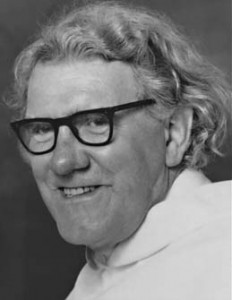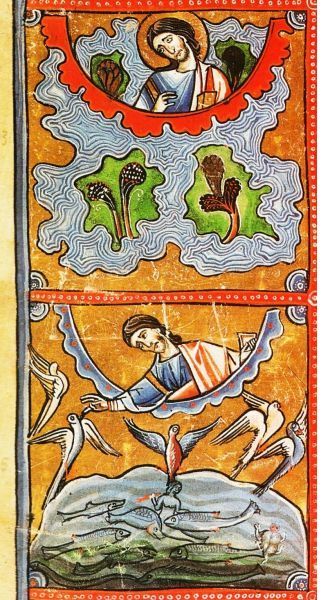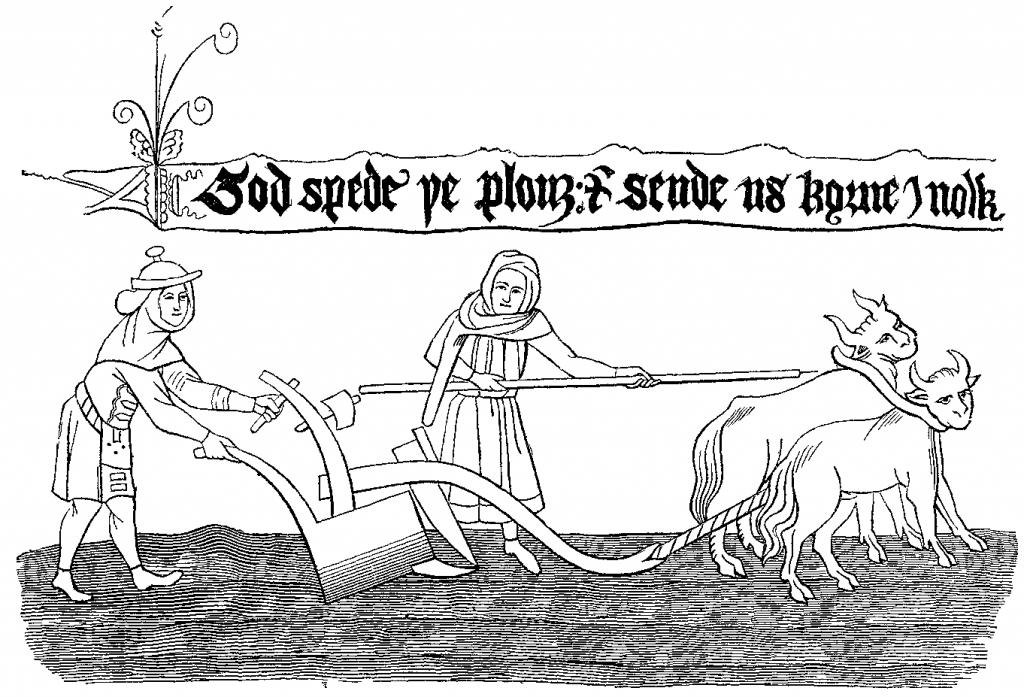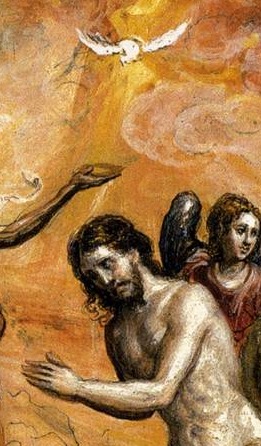 Herbert McCabe, and other philosophers for whom I have a lot of respect overall, suggest from time to time that according to classical theology à la Thomas Aquinas we shouldn’t expect to see any signs of God’s handiwork in creation, even though it is all utterly dependent on him ontologically. This is because he creates secondary causes to be sufficient explanations in themselves – there are no gaps for God to fill. This argument is used by them and, derivatively, by Evolutionary Creationists to dismiss not only ID but all natural theology (and, strictly speaking, an active theology of nature too) on principle.
Herbert McCabe, and other philosophers for whom I have a lot of respect overall, suggest from time to time that according to classical theology à la Thomas Aquinas we shouldn’t expect to see any signs of God’s handiwork in creation, even though it is all utterly dependent on him ontologically. This is because he creates secondary causes to be sufficient explanations in themselves – there are no gaps for God to fill. This argument is used by them and, derivatively, by Evolutionary Creationists to dismiss not only ID but all natural theology (and, strictly speaking, an active theology of nature too) on principle.
There’s good theological insight in the idea that God is entirely other than his creation, but I’ve never felt it is quite right as an argument, because I see no reason that ontological dependance should, necessarily, be beyond natural perception.The making of wine from water at Cana was, after all, in some sense an act of creation that was obvious to all who witnessed it.
If we go back to Augustine, he saw the Genesis 1 account as surprising because God took so long as seven days to make the world – as the infinite Creator in eternity why would he not do it instantly? Augustine’s answer was that the seven-day pattern was an accommodation to human understanding. And I’d agree with him, except that I think there is a good case for saying that the human understanding being accommodated was, originally, that of the creation as a temple being made by God in a ritually significant seven-day period.
 Despite Augustine’s figurative explanation, classical Christianity tended to take the seven day creation as history, for the lack of any pressing need to modify it, until the discovery of deep time at the end of the eighteenth century. It was against that literalistic background, of a week of special divine creative acts “into” a part-formed world, that the classic Christian doctrines of creation developed. It was upon this that the modern scientific account of secondary causes was gradually superimposed, starting way back with people like Albertus Magnus in the thirteenth century:
Despite Augustine’s figurative explanation, classical Christianity tended to take the seven day creation as history, for the lack of any pressing need to modify it, until the discovery of deep time at the end of the eighteenth century. It was against that literalistic background, of a week of special divine creative acts “into” a part-formed world, that the classic Christian doctrines of creation developed. It was upon this that the modern scientific account of secondary causes was gradually superimposed, starting way back with people like Albertus Magnus in the thirteenth century:
“In studying nature we have not to inquire how God the Creator may, as He freely wills, use His creatures to work miracles and thereby show forth His power; we have rather to inquire what Nature with its immanent causes can naturally bring to pass.”
But he was, of course, distinguishing miracle, not creation, from nature – miracles are not creation because they produce exceptions to normality, whereas creation produces a new normality. But they share the fact that both are acts above and beyond the capabilities of secondary causes. For that reason, I’m skeptical when a philosopher like McCabe seems to imply that special creation, once the universal belief, is not just scientifically, but theologically unorthodox.
It’s true that mainstream theology even before deep time conceived of God’s creation as, from his viewpoint, one single eternal act (such as Augustine conceived). Paul Helm only reiterates conventional Reformed Theology when he writes of all God’s activity as “one action, which has numerous temporally scattered effects.”
But traditional theology also had room to see that action as corresponding within creation to the divine Fiats of the Genesis account over time, just as one would acknowledge God’s thunderous affirmation “This is my beloved Son, in whom I am well pleased” as being truly perceived by hearers in Judaea in 30AD though actually, like all God’s acts, eternal and outside space and time.
One other insight (that actually postdates classical theology) is that, almost certainly, the Genesis 1 account is not formulated in terms of creation ex nihilo, either because that concept was a later revelation in the biblical account, or simply because it suited the genre of the story. Rather, as John Walton and other scholars have argued and as I have discussed frequently, the emphasis of the word bara, “create”, is on bringing things to useful function (especially for mankind), rather than simply bringing them into existence. Employing later Greek conceptions, one could say that creation fundamentally implies cosmos, good order.
 In an odd way, then, the Genesis account, whilst not being in any way intended to convey scientific truth (and I agree it would be in numerous ways erroneous if that were its intention, even though I think the “goldfish-bowl” cosmology usually attributed to it is bogus), is actually like the modern scientific view a story of development and innovation over time. It occurs to me, then, that it’s a useful model for thinking about the implications of creatio continua and hence “evolutionary creation” so-called, whilst remaining clear of scientifially contentious issues.
In an odd way, then, the Genesis account, whilst not being in any way intended to convey scientific truth (and I agree it would be in numerous ways erroneous if that were its intention, even though I think the “goldfish-bowl” cosmology usually attributed to it is bogus), is actually like the modern scientific view a story of development and innovation over time. It occurs to me, then, that it’s a useful model for thinking about the implications of creatio continua and hence “evolutionary creation” so-called, whilst remaining clear of scientifially contentious issues.
So let us, purely as a thought experiment, imagine that the account of Genesis 1 occurred literally, in the material or scientific sense (it is indeed literally true in other more fundamental ways when one correctly understands its genre). That is, we’ll suppose that although the eternal God conceived of creation and accomplished it in one intuitive act in eternity, it worked itself out in the seven days of changes within the world in response to his words of command to it in time.
Now, taking things that way, we are agreeing uncontroversially that God creates all the secondary causes in the present world. But there is no theological necessity for believing that he created them all at once – in the Genesis narrative, on the contrary, he did not. So (as I discussed recently in the post on “the deep”) the “initial conditions” for the world included a deep ocean covering a formless earth, with darkness above. Into that situation God says “Let there be light”. Likewise on the second day, the waters are separated by the creation of the raqia (however conceived). On the third day God gathers the seas to expose the dry land, which at his word brings forth vegetation, and so on over the week.
Now there is nothing in that description that implies, or even allows, light to be an emergent property of darkness and deep, or firmaments to arise “naturally” by the turbulence of water, or tectonic land-building activity to be an intrinsic feature of eretz, or rock to give rise to vegetation in the nature of things once it gets dry. Yet most of the material changes in Genesis occur by modifying existing matter, rather than ex nihilo. The creative act is predominantly that of organisation (or perhaps the imposition of form), not that of calling things into existence from nothing. Still, all these things are treated as acts of divine creation within time, bringing about the changes in what, apart from his commands, would have remained in a state of disorganisation.
It’s true that God commands the earth to bring forth vegetation and living creatures – a fact that some TEs have illegitimately treated in an accommodationist way to suggest that Genesis teaches evolution (sometimes the very same people who deride Creationists for taking Genesis as a scientific account! Go figure). But even if God were, indeed, setting up material secondary causes to lead to biogenesis and evolution, rather than (more realistically from a literary point of view) just creating living beings within their appropriate supporting habitat, the text treats their initiation as an act of true creation in time. Nothing in the passage suggests that, in the theology of the narrative, the earth always had the capacity to bring forth life, or to change its forms along the way.
I conclude, therefore, that since the literal interpretation I’m considering (whilst, remember, not holding it myself) is that of most classical theologians down the centuries, there is nothing intrinsically untheological about the idea that God might create in time what would otherwise not exist or occur. It’s absolutely orthodox and, historically speaking, almost uncontested. Therefore in a world of change, such as the long world history conceived by modern science, the Christian has to decide whether particular secondary causes were created ab initio (say, at the Big Bang as “laws” leading to present outcomes) or de novo “in real time” upon the evidence, and not simply on McCabe’s theological principle of a closed physical universe intersected by the complete inscrutability of the God of eternity as he maintains and governs it.
How would this conclusion treat natural theology, then, ie the idea that signs of such creative activity are evident in the world? Unless we assume in advance that the world has always been a closed system of secondary causes, the possibility remains that God brings about some changes apart from existing material causes.
For example, it might in principle be true that there are insufficient means in nature to bring about biological innovations, and that the continued search for scientific causes might be as fruitless as it would be within the world of our literal interpretation of the Genesis account, such as looking for a cause of firmaments in the turbulence of seawater. Essentially, it seems to me, you can only confidently invoke secondary causes once you have actually discovered and enumerated them. It is untheological (and unscientific too, except as blind adherence to methodological naturalism) to insist that undiscovered secondary causes must exist, though of course quite legitimate to say they might exist and go looking for them.
Maybe we can approach how that plays out via our literalistic model by imagining, per impossibile, that a modern scientist were actually around to observe the changes in creation week. It’s not that inconceivable an exercise, in the sense that Genesis 1 is in any case told from the viewpoint of a human, or at most an angelic, observer. We’re just adding another hypothetical observer without access to the divine deliberation.
What such a viewer would see would be dictated, in fact, by his presuppositions. For he would not see the invisible God (nor even, qua scientist operating under methodological naturalism, be permitted to consider him, hovering above the surface of the water, as a cause). He would therefore suddenly see light appear on Day 1, and begin to alternate with darkness on a daily basis. He might wish to explain that change mechanically in some way, or more fundamentally as the first appearance of time itself. It would be a tough one to investigate, but he might well assume that the deep had some kind of intrinsic property called “space-time”, and begin to research it from the phenomenon of diurnal alternation. He would at length discover that space-time does exist – and perhaps conclude wrongly that it therefore always had.
Likewise for the appearance of the firmament. Whether made of air or tin, it would appear there now, and its formation would no doubt be susceptible to as many general naturalistic explanations as, say, theories for the formation of the solar system or life, all of which would be wrong.
And so on for the rest of the week’s work. Where origins could not be explained, which ex hypothesi they could not be, because they were actually simple creative acts of God, there could still be plausible naturalistic explanations – provided the detail were not pressed – based on investigating the state of the world after it was created. And where no plausible theory presented itself, he could plead the need for future research on the credit of the successful theories now in existence. In other words, scientific investigation of the world according to a literalistic interpretation of Genesis 1 would look very little different in principle from current scientific research on the real world.
Paradoxically, it would be a non-scientist who saw the works of God in the things appearing who would be closer to the literal truth. He could not, of course, prove his view over that of the scientist – except that the scientist’s theories would in the end prove insufficient (or, as he would say, still under investigation) and equally unproveable. Appealing to the evidence of design as proof of God would be natural theology: but equally appealing to the non-evidence of design as proof of “natural” causes would be an entirely equivalent natural a-theology. Neither would affect the fact of the matter one whit.
I suspect Herbert McCabe might have suggested that a world like that – with invisible creative actions of God apart from secondary causes – would be unintelligible and therefore unworthy of him. But by the same token, hearing the voice of God from heaven is no more intelligible, if your criterion is the internal consistency and self-sufficiency of Creation. Maybe that’s why some people were prone to mistake such a voice for thunder, missing out on vital revelation for the sake of intelligibility.


Jon –
I noticed a while ago you made a really nice post about my conference on Alternatives to Methodological Naturalism. Anyway, I didn’t know how to contact you except through here, but I wanted to let you know that the book from the conference is now out and you can find it here:
Naturalism and Its Alternatives in Scientific Methodologies
Thanks a lot Jonathan – a subject close to my heart. Glad you noticed the post.
Funnily enough I put your book on my Amazon wishlist this evening: the packet boat carrying it across the Atlantic to the UK has not yet arrived, so I may have to wait a little!
If you’re lurking, the next post in a couple of days is tangentially linked to the same theme, ie challenging the idea that it’s theologically improper to look for signs of creation within nature.
What on earth am I talking about – this is that post! It seems like the thought-waves are travelling more slowly than the US packet!
Anyway, welcome indeed to the Hump of the Camel. We’re usually less dozy than this!
Hi, Jon. I’ve been inactive for a while, overwhelmed by teaching responsibility and other matters, but I read your post and wanted to say that it was very well-written and that I agree with it, probably entirely.
You might have added, in response to McCabe (and the same response could be made to some statements of Feser, Beckwith and other recent Catholic philosophers who purport to represent the correct meaning of Thomas Aquinas), that Aquinas himself — in direct contradiction to certain modern writers (some Thomist, and some Protestant evangelical BioLogos TEs) — thought that God’s glory was more clearly shown when he on occasion worked directly rather than through natural causes. You might also have added — as was pointed out by Vincent Torley on Uncommon Descent — that Aquinas in fact believed that at some of the acts of creation (i.e., of man and of higher animals) involved direct divine action, to produce what “second causes” would not be capable of producing. But probably you have made both of these points elsewhere, in other columns, and I mention them not to find fault with your article, but only to indicate further support for your conclusions.
Hi Eddie
Good to know you’re busy rather than bored!
Yes, I have said a little on Aquinas in other posts – the brief was a bit different this time. He’s interesting in several ways, firstly in affirming that most other theologians took Genesis 1 chronologically, secondly in expressing a personal preference for Augustine’s idea of instant creation, thirdly (considering the modern Creationist perspective) for not anywhere committing himself to a particular concept of “day” and fourthly for pleading caution in being dogmatic on interpretation lest future discoveries bring the faith into disrepute.
On that last point one could trot out deep time and evolution as examples, but also the recovery of some of the thought-forms and genres of the ANE. He was a wise man.
One line he was always keen to keep open, because of then current science’s claims about an eternal universe (also for now overturned by the Big Bang), was that ontological dependence doesn’t depend on chronological matters. What that means here is that each of the creative phases in Genesis, in his view, were direct and separate creative acts of God, even if they occurred simultaneously: which is to say that they can still not be explained in terms 0f other secondary causes. That means science cannot be a single comprehensive system of knowledge, at least with a “law of everything”.
The (predominant) Evolutionary Creation question is rather different, and not of course even considered by Aquinas – in that it’s a hybrid claim that (a) creation didn’t occur all at once but over billions of years but yet (b) it all depends on secondary causes put in place at the very beginning, without further divine action.
Aquinas, again, absolutely distinguishes “creation” – ie new things (and that would include form/information) from nothing – and “change” through secondary causes, which makes the idea of “creation through evolutionary change” an oxymoron.
Would he have considered the elusive origins of new biological forms to be “change” or “creation”? It’s hard to say. But as you say, he did write that God’s glory was greater served by direct than secondary action, and also had a strong doctrine of special providence close to “creatio continua”: God’s governance of nature was as direct and contingent as his creation of nature.
We should also remember that he knew his non-chronological creation was a minority position: and my point is that the doctrined of creation of the Church as a whole were based on sequential creation, and Aquinas had no theological beef against that.